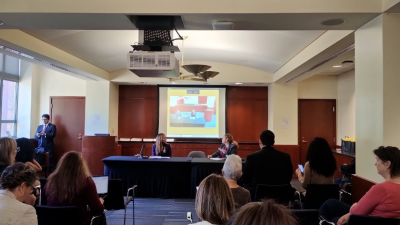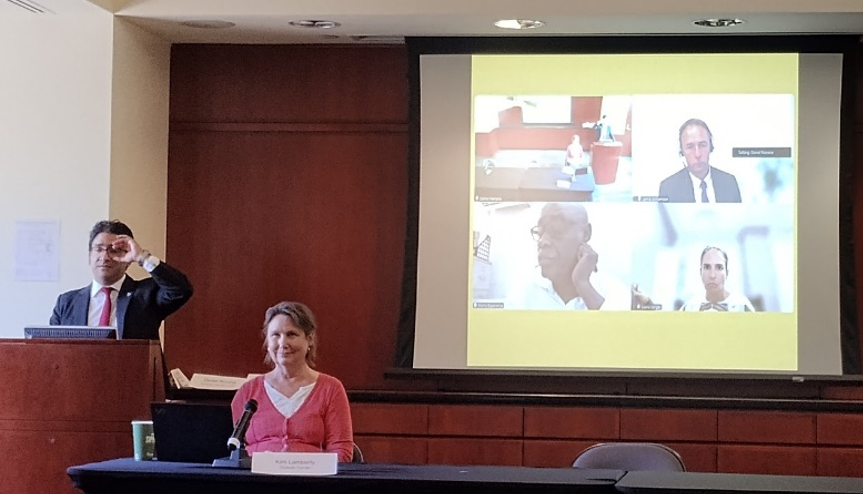
On September 4th, 2025, Amnesty International convened, and Quixote Center co-sponsored, an academic conference to bring together experts and advocates from Haiti and the US and explore solutions to the multiple crises Haiti faces today.
Opening remarks from Congresswoman Sheila Cherfilus-McCormick emphasized the importance of Haitian-led solutions and recognized global responsibility for the trafficking of guns and drugs flooding Haiti.
Below, we synthesize the main themes that came out from four panels of experts, which followed the opening remarks. All the data we share here came from the panelists’ remarks.
Corruption
The Haitian people did not choose the nine members of Haiti’s transitional government. The PHTK party dominates the government, and they have direct links with the gangs and help to sustain their stranglehold on the country. Their mandate is to organize elections in February 2026, which is unlikely due to insecurity. The OAS expects the next Haitian elections will not happen before 2028.
Haitian human rights experts claim that the corruption and incompetence of the authorities have created a situation where the gangs now act as the de-facto government. The gangs decide where people live, and in what conditions they live, while terrorizing local populations. Politicians facilitate the distribution of arms.
This “gangsterization” of Haitian society has also heavily impacted the nation’s economy. In 2024, the GDP fell by 4%, inflation rose by 30%, and 50,000 jobs were lost. The informal economy has been hit the hardest as small business owners fall prey to extortion, leading them to close shop and flee. An estimated 1.3 million Haitians are displaced; many are now living in camps with rationed food, scarce sanitary units, sexual violence, and no electricity at night.
Many communities have created their own self-defense brigades, further exposing the failure of the state and national police to protect them. Instead of mitigating violence, these vigilante groups often exacerbate the crisis by killing any outsider who looks different. Anyone with a tattoo or piercing could be considered a potential gang member.
Some panelists identified as a root cause of the current crisis the Petrocaribe scandal that shook the nation when $2 billion in aid from Venezuela between 2008 and 2016 vanished, along with promises of new infrastructure and social programs. Haitians were outraged, and police violently suppressed their protests.
Assault on women and youth
Amnesty International produced a report in February 2025 highlighting how the gang takeover in Haiti is “an assault on childhood”. Their research focused on the capital, Port-au-Prince where they spoke directly with 110 people, including 50 children, 40 of whom were gang recruits. The sexual violence perpetrated on women and girls, with impunity, in displacement camps and by gang members is so prevalent and normalized, it is almost expected by Haitian girls.
Young Haitian boys and teenagers find themselves with no other choice than to join gangs to stay alive and help their family financially. The many youths who have been forcefully displaced and are not enrolled in any school are particularly vulnerable to gang recruitment.
Illegal gun trafficking and Private Security Contractors
Gangs acquire military-grade weapons through illegal arms trafficking from the US to the Caribbean, and the national police are underequipped. Panelists recognized the failure of the underfunded MSS effort with a Kenyan police force that does not know the language, the culture, nor its way around. In March 2025, the Transitional Government contracted with the private security group formerly known as Blackwater. According to panelists, they have deployed kamikaze drones that strike targets selected by Haiti’s prime minister, leaving major gang leaders unscathed.
Haitian businesses and organizations contract their own private security to keep their operations running. There are about 50,000 private security guards in Haiti but no clear framework or protocol in place to determine if they can use firearms and in what situations.

Panelists emphasized that Haiti needs to retain control of its own borders; at the same time the US and international community are responsible for preventing illegally trafficked guns from reaching the border in the first place.
Haitian-led solutions and international cooperation
International intervention in Haiti has and continues to be paternalist and disrespectful. After decades of abuse and failures from UN led missions, the OAS recently created a road map for the future of Haiti without any Haitian representative at the table. This is an insult to Haiti’s sovereignty. Any plan that is not Haitian-led is bound to fail. Haitians must lead the way. International organizations need to learn how to listen instead of imposing their worldview and methods upon Haitians.
Many panelists advocated for the strengthening of Haitian National Police with better equipment and training. Other proposed solutions focused on supporting food security programs and working with local organizations to prevent sexual violence. There are many women-led groups throughout the country that could benefit from training in political leadership. Only 3% of the members of the government are women.
The judicial branch in Haiti needs strengthening, to rein in the corruption afflicting the politics and national security. Without justice, it will be impossible to secure a lasting peace. The country also needs to prioritize reintegration, instead of criminalization, of Haitian youth who have been recruited into gangs.



Comments
Lois Wilcken (not verified)
I advocate the networking of Haiti's grassroots organizations with kindred organizations in other oppressed nations in a spirit of mutual aid. For example, Haiti belongs to the Caribbean branch of Via Campesina. More of this can go a long way. No nation can go it alone.
Thank you for the opportunity to add a comment.